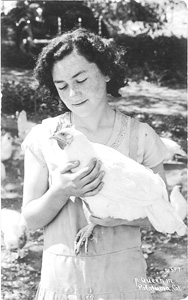![[Metroactive Movies]](/gifs/movies468.gif)
[ Movies Index | Show Times | North Bay | Metroactive Home | Archives ]
Shalom on the Range
'A Home on the Range' explores Petaluma's Jewish chicken-ranching community
By Sara Bir
In a word association game, the most common response after "Jewish" and "chicken" would probably be "matzo ball soup," not "Petaluma." But, as Bonnie Burt and Judith Montell's documentary A Home on the Range: The Jewish Chicken Ranchers of Petaluma demonstrates, there was once a vibrant, close-knit, and hard-working group of Jews who came to Petaluma to build new lives--and raise chickens.
In the 1920s, Petaluma's hospitable climate drew a group of progressive Jews to learn agriculture before leaving for a kibbutz in what is presently Israel. Some, however, never left California, and this group planted the seeds of the Jewish community there.
Word began to spread back East, and, coupled with the lure of Jack London's writings and a new life, families came. "Jews couldn't own land in the old country," says Burt, "so it was an honor and something miraculous that they could own land here. They were very tied to the land. I think it symbolized a freedom that they had never known."
Most of the ranchers had no agricultural background at all, and making a living raising chickens was labor-intensive. Besides simply trying to make ends meet, they also faced prejudice. Part of the film tells a little-known, dark blip on Sonoma County history, when a group of Jews who were trying to unionize apple pickers were kidnapped from their homes by a prominent Sonoma County businessman and tarred and feathered.
The community stuck together, for a while at least. "They were immigrants, the first generation, and a lot of them didn't speak English well. They needed each other in a way that current generations do not," says Burt.
"What was so beautiful about the community is that they were so helpful to newcomers," continues Montell. "They would loan them money to rent a ranch, they would collect furniture. It was a very loving group, but at the same time it was very critical of everything and everybody."
Chicken ranching began to decline in the early '60s when agribusiness took over, and the identity of the community likewise began to fade. "You have to recognize that these were immigrants, and as they got older, their children were interested in becoming more Americanized," Montell says. "That's what I think is so interesting about this story--that it parallels many immigrant communities' experiences, that the first generation is there and very tied together . . . and then the second, third, and fourth generations start to dissipate as they become Americanized."
A Home on the Range screens with Burt's short video Song of a Jewish Cowboy, which profiles Scott Gerber, a descendant of left-wing chicken ranchers. An introspective rancher with the swagger of a genuine cowpoke, Gerber sings cowboy and Yiddish songs. "I met Scott, and I thought that he was so intriguing and charming, and what he was doing by carrying on the culture was admirable and unique," says Burt.
[ North Bay | Metroactive Central | Archives ]
Copyright © Metro Publishing Inc. Maintained by Boulevards New Media.
![]()
 Chicken Soup for the Soul: The Jewish chicken farmers of Petaluma were a tight-knit, chicken-loving community.
Chicken Soup for the Soul: The Jewish chicken farmers of Petaluma were a tight-knit, chicken-loving community.
'A Home on the Range' screens Friday, Sept. 27, at 7pm and Sunday, Sept. 29, at 4pm at the Sonoma Film Institute, Darwin 108, 1801 E. Cotati Ave., Rohnert Park. Filmmakers Bonnie Burt and Judith Montell will appear at the Sunday screening. $4.50 general admission. 707.664.2606.
From the September 26-October 2, 2002 issue of the North Bay Bohemian.